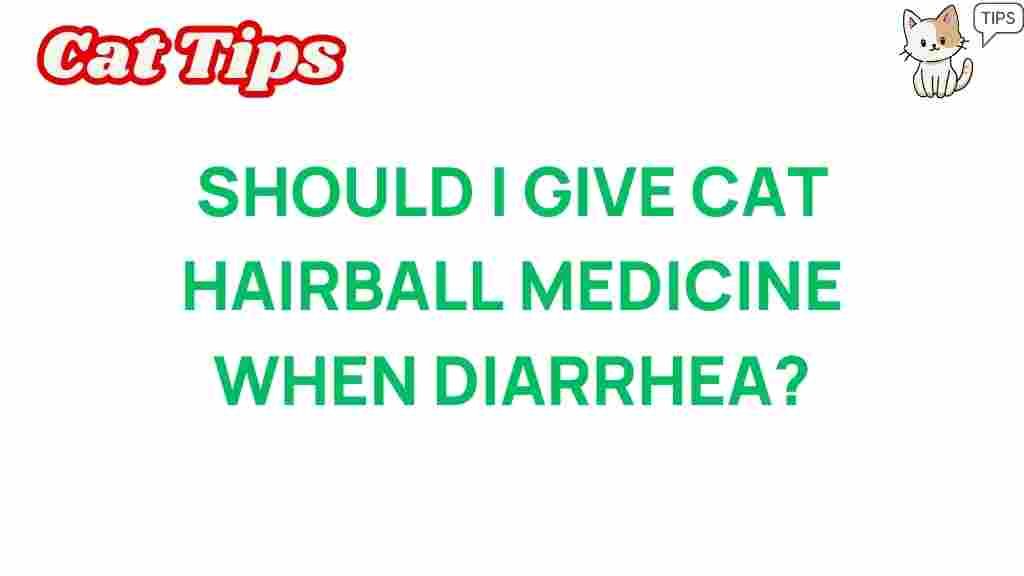The Surprising Link Between Cat Hairball Medicine and Diarrhea: Understanding Cat Health
When it comes to cat health, many pet owners focus on the more visible issues like obesity, dental health, or even grooming. However, there’s a lesser-known aspect that can significantly impact your feline friend’s well-being: the relationship between hairball medication and diarrhea. This connection is often overlooked, yet understanding it can provide deeper insights into your cat’s overall health.
Understanding Hairballs in Cats
Hairballs, or trichobezoars, are a common occurrence in cats, especially those with long fur. They form when cats groom themselves and ingest loose hair, which can accumulate in the stomach.
- What causes hairballs?
- Excessive grooming due to anxiety or boredom
- Shedding during seasonal changes
- Skin conditions that lead to increased grooming
- Signs of hairballs:
- Vomiting
- Loss of appetite
- Constipation or straining to defecate
While hairballs are a natural part of a cat’s life, they can lead to complications if not managed properly. This is where hairball medicine comes into play.
What is Cat Hairball Medicine?
Cat hairball medicine typically contains lubricants and fiber to help hairballs pass through the digestive system more easily. Common ingredients include:
- Petroleum jelly
- Vegetable oil
- Fiber sources like psyllium or beet pulp
These products can be effective in reducing the frequency of hairballs, but they can also lead to gastrointestinal issues in some cats, including diarrhea.
How Cat Hairball Medicine Can Cause Diarrhea
Understanding the link between cat hairball medicine and diarrhea is essential for maintaining overall cat health. Here are the primary reasons why hairball medication can lead to loose stools:
1. Ingredients and Digestive Sensitivity
Some cats have sensitive digestive systems, and the lubricants in hairball medicine can sometimes cause gastrointestinal upset. The following factors can contribute:
- Fat Content: High-fat content in some hairball treatments can lead to diarrhea.
- Fiber Overload: An excessive amount of fiber can disrupt a cat’s digestive balance, resulting in loose stools.
2. Changes in Diet
When administering hairball medicine, pet owners often change their cat’s diet to include more fiber-rich foods. Sudden dietary changes can cause digestive disturbances, including diarrhea. It’s essential to transition gradually to minimize gastrointestinal upset.
3. Underlying Health Issues
In some cases, persistent diarrhea may not be directly related to hairball medication but rather an underlying health issue. Conditions such as:
- Inflammatory bowel disease (IBD)
- Parasites
- Food intolerances
should be ruled out by a veterinarian. If your cat continues to experience diarrhea after using hairball medicine, consult a professional.
Preventing Diarrhea Related to Hairball Medicine
Here are some practical steps to ensure that your cat remains healthy while using hairball medication:
1. Choose the Right Product
Not all hairball medications are created equal. Look for products that are specifically formulated for your cat’s weight and health needs. Consult your veterinarian for recommendations on the best hairball medicine for your pet’s specific condition.
2. Gradual Dietary Changes
If you plan to change your cat’s diet to include more fiber, do it gradually. Mix increasing amounts of the new food with the old over several days:
- Days 1-3: 25% new food, 75% old food
- Days 4-6: 50% new food, 50% old food
- Days 7-10: 75% new food, 25% old food
- Day 11 onward: 100% new food
3. Monitor Water Intake
Ensure your cat is drinking enough water, as dehydration can worsen diarrhea. Provide fresh water daily and consider wet food options to help keep them hydrated.
4. Regular Grooming
Regular grooming can help reduce the amount of loose hair your cat ingests. Brush your cat frequently, especially during shedding seasons. This will not only help prevent hairballs but also support their overall health.
5. Consult Your Veterinarian
If your cat experiences diarrhea after taking hairball medicine, it’s crucial to consult your veterinarian. They can recommend alternative treatments or investigate underlying health issues that may be contributing to the problem.
Troubleshooting Diarrhea After Hairball Medicine
If your cat suffers from diarrhea after using hairball medicine, here’s a step-by-step troubleshooting process:
1. Discontinue Medication
Stop administering the hairball medicine immediately to see if the diarrhea resolves. Monitor your cat’s condition for a few days.
2. Assess Dietary Changes
Evaluate if you’ve recently made any dietary changes. If so, revert to the previous diet and slowly reintroduce any new foods over time.
3. Check for Other Symptoms
Observe your cat for any additional symptoms such as:
- Vomiting
- Lethargy
- Loss of appetite
If any of these symptoms are present, contact your veterinarian immediately.
4. Maintain a Diary
Keep a diary of your cat’s diet, medication, and any changes in behavior. This information can be invaluable for your veterinarian in diagnosing the issue.
5. Follow Up with Your Veterinarian
If the diarrhea persists for more than 24 hours, schedule an appointment with your veterinarian. Bring along the diary you’ve maintained for a comprehensive view of your cat’s health.
Conclusion: Prioritizing Cat Health
The surprising link between cat hairball medicine and diarrhea highlights the intricacies of cat health that many pet owners may overlook. While hairball medicine can be essential for preventing hairball-related issues, it’s crucial to monitor your cat for any side effects, particularly gastrointestinal disturbances like diarrhea.
By choosing the right products, making gradual dietary changes, and maintaining regular veterinary check-ups, you can ensure your cat’s health is prioritized. Remember, a healthy cat is a happy cat, so keep an eye on their grooming habits, diet, and overall well-being to avoid complications related to hairballs and the medications used to manage them.
For more detailed information on cat care and health, check out this resource on feline nutrition. And remember, your veterinarian is your best ally in keeping your furry friend healthy!
This article is in the category Health and created by CatTips Team
